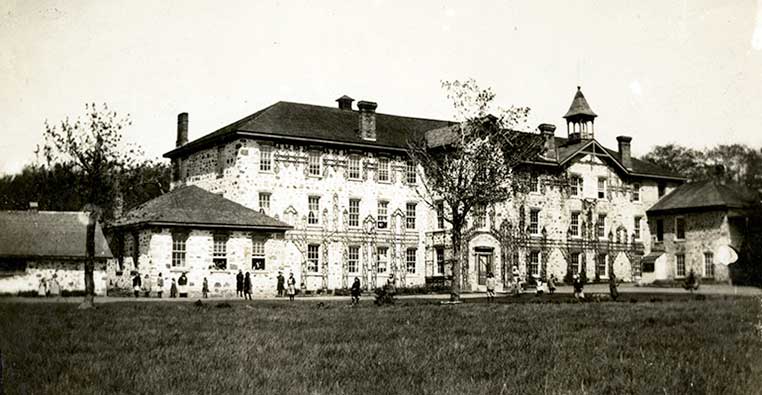
Locations and Dislocations: Places and Spaces in Contemporary Women’s Writing
International Contemporary Women’s Writing Association Conference, 3-5 July 2019, Algoma University, Sault Ste. Marie, Ontario, Canada
Please register before June 21, 2019. Participants will not be registered until payment via Paypal has been completed. Once you press submit on the form, you will be automatically redirected to a Paypal payment tab.
More information on booking for your accommodation is available below.
This International Contemporary Women’s Writing Association Conference will examine how contemporary women writers have engaged with places and spaces in all the complexities suggested by Algoma University’s location. The conference will explore women writers from the 1960s to the present day. The academic papers will raise a wide range of critical questions. How should we treat historical sites of violence? Can they be reclaimed and what is the role of writing in that process of reclamation? What kinds of spaces are depicted as “sacred” by contemporary women writers? How do particular landscapes play a role in constructing national myths and identities? What does it mean to have an Indigenous connection to land and place? In what ways have contemporary women writers depicted borders? How are contemporary women writers writing the city? What contribution has contemporary women’s writing made to our cultural and political debates about how to interact with natural spaces? How do contemporary women writers depict domestic spaces?
The 2019 Contemporary Women’s Writing Association International Conference theme is inspired by its location at Algoma University in Sault Ste. Marie, Northern Ontario, Canada. Algoma University occupies the historical site of the former Shingwauk Residential School to which displaced Anishinaabe children were
sent to receive a colonial “education.” Survivors of the Shingwauk Residential School formed the Children of Shingwauk Alumni Association and have helped guide the development of education here, launching the first major, permanent, residential school Survivor-driven exhibition in a former residential school building in 2018. Algoma University sits alongside Shingwauk Kinoomaage Gamig (an Anishinaabek institution for university studies) on this sacred site set aside for the fulfillment of Chief Shingwauk’s vision of respectful inter-cultural education. Surrounded by iconic Canadian maple bush in the heart of the Great Lakes, Anishinaabe people refer to this region as “Bawating”—“the place of the rapids”—and it has a long history as a meeting and trading place. As a declining steel town, Sault Ste. Marie raises crucial questions about the future of post-industrial cities. The city has staged the often fraught encounter between economic development based on extractive and heavy industries and the preservation of areas of outstanding natural beauty. Sault Ste. Marie is also a border city twinned with Sault Ste. Marie, Michigan, U.S.
Join us to explore this important theme in this beautiful place! Email [email protected] with any questions you may have.
Book your Accommodations
Delta Hotel
To book your hotel with the Delta at a reduced rate, please click here
- On campus
To stay on campus, please email [email protected]
*To assure that you receive the reduced rate, please make sure to include your name, arrival and departure date, and to mention that you are part of the CWWA conference.
Apply for CWWA Travel Bursary
Please complete the Postgraduate Travel Bursary Application Form (DOCX) and return to [email protected] by Monday, June 3, 2019
Note that successful recipients will be required to write a brief blog about the conference for the CWWA website.
Guest Speakers
Learn More About

Gwen Benaway
Gwen Benaway is a trans girl of Anishinaabe and Métis descent. She has published three collections of poetry, Ceremonies for the Dead, Passage, and Holy Wild, and was the editor for an anthology of fantasy short stories, Maiden Mother and Crone: Fantastical Trans Femmes. Her writing has been critically acclaimed and widely published in Canada. She was a finalist for the Dayne Ogilvie Prize for LGBTQ writers from the Writer’s Trust of Canada, the Lambda Literary Award for Trans Poetry, and the National Magazine Awards and Digital Publishing Awards for her personal essay, A Body Like A Home. Her fourth collection of poetry, Aperture, is forthcoming from Book*hug in Spring 2020. She is also currently editing a book of creative non-fiction, trans girl in love, forthcoming from Strange Light in 2020. She lives in Toronto, Ontario and is a Ph.D student at the University of Toronto in the Women and Gender Studies Institute.

Lee Maracle and Columpa Bobb
Lee Maracle is a Sto:Loh nation grandmother of four, mother of four who was born in North Vancouver, BC. Her works include: the novels, Celia’s Song, Ravensong, Sundogs; short story collection, Sojourner’s Truth; poetry collection, Bentbox; and non-fiction work I Am Woman. Ms. Maracle is a both an award winning author and teacher. She currently is Mentor for Aboriginal Students at University of Toronto where she also is a teacher and also the Traditional Cultural Director for the Indigenous Theatre School, where she is a part-time cultural instructor.
Columpa C. Bobb is an award-winning performing artist, director, playwright and producer. Columpa is originally from Stó:lō nation, located in British Columbia. Currently, she resides in Winnipeg, Manitoba, where she is the co-founder, and Artistic Director, at Urban Indigenous Theatre Company & The Aboriginal Arts Training Program. One of Columpa’s most recent achievements includes Hope Matters, a book of poetry written with her mother, Lee Maracle, and sister, Tania Carter. Columpa is most recognized for the role of Mary Cook on the CBC Television show North of 60 and guest roles on the series The Rez.


